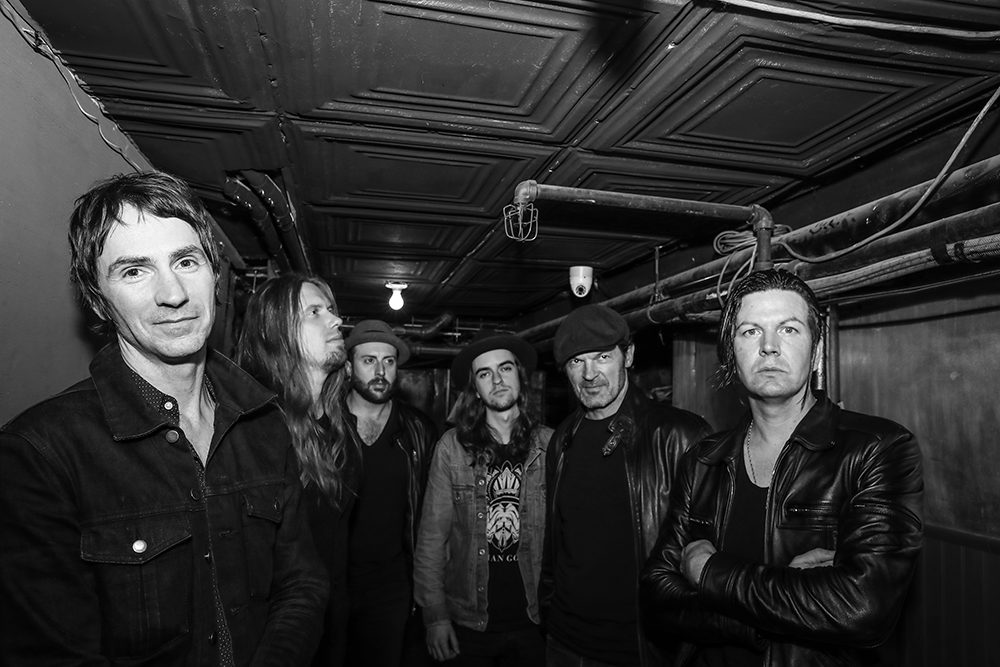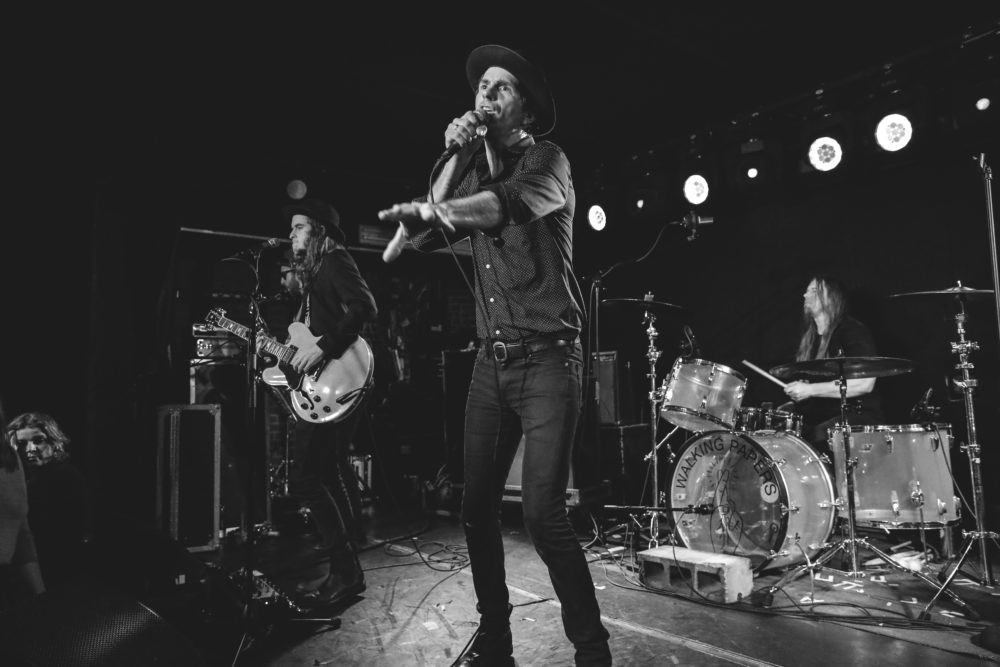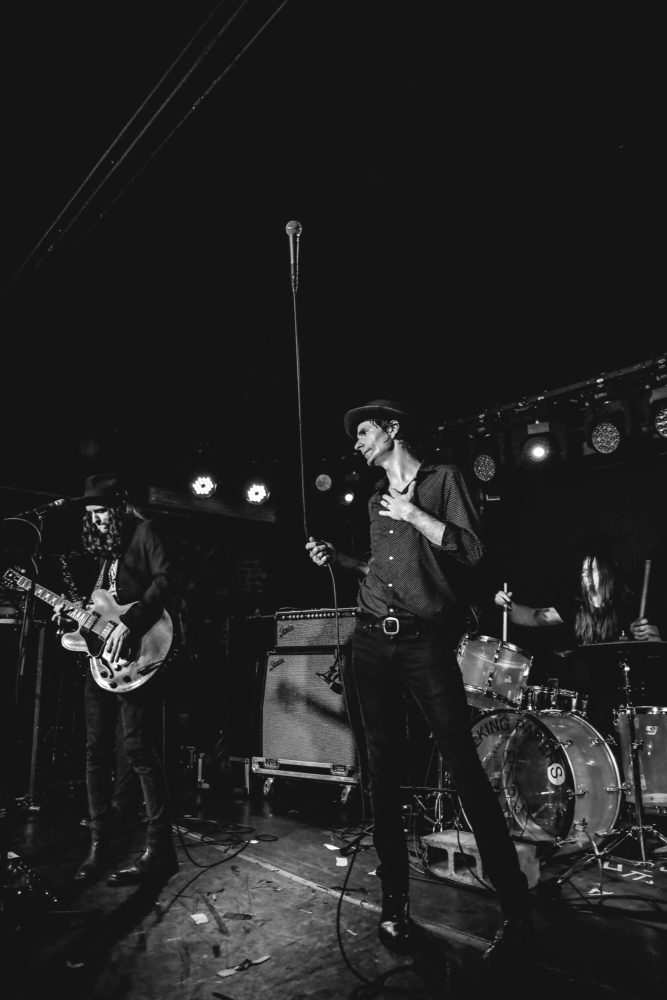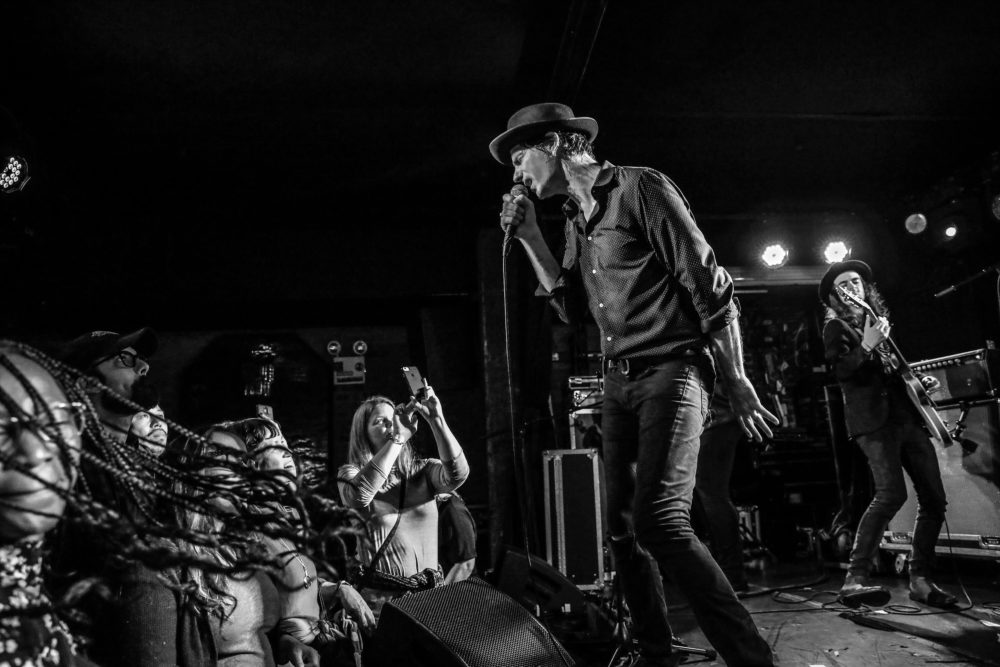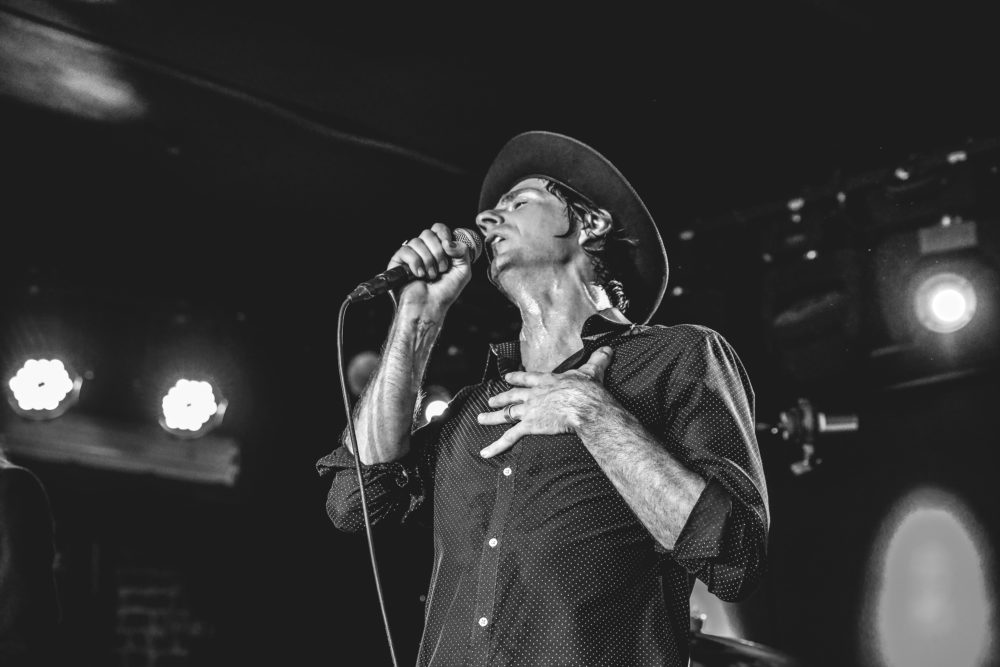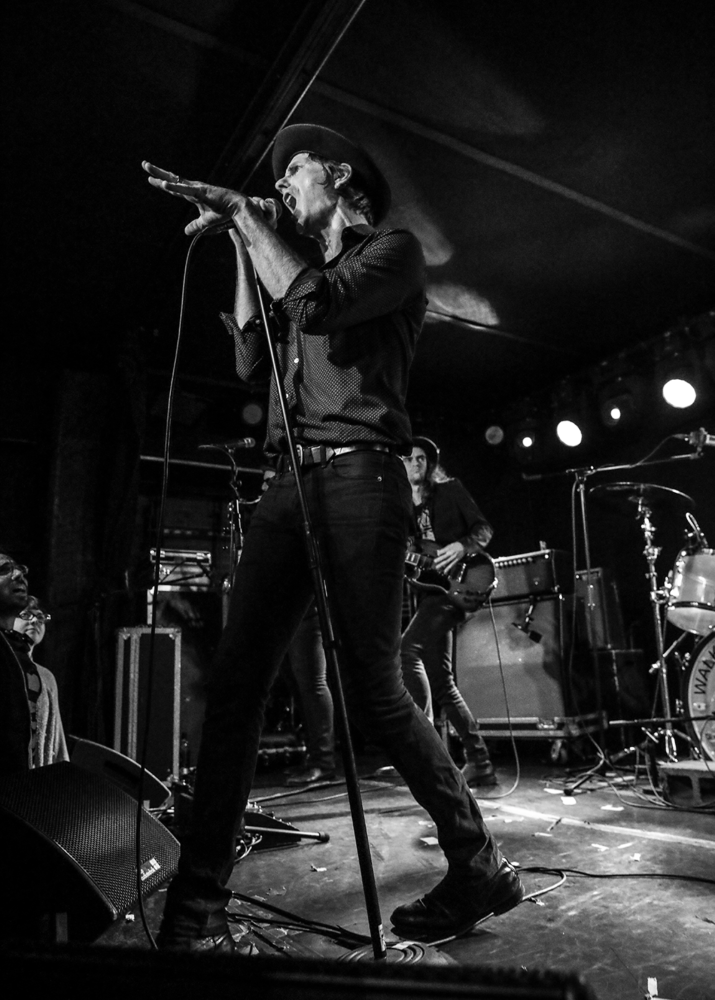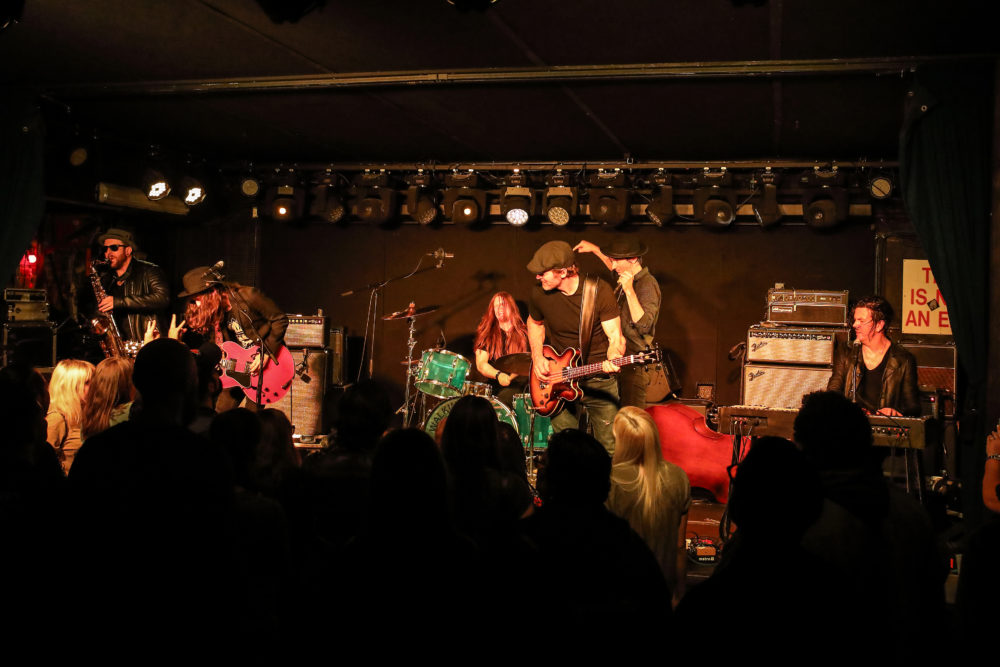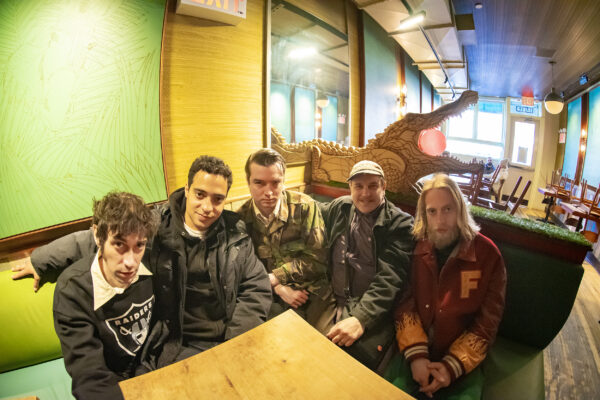In the presence of rock heroes, like those that make up Seattle’s Walking Papers, it’s easy to go into overdrive trying to memorize every piece of the experience. In that mode, you sometimes end up with strangely specific details coloring the scene; the sound of Jeff Angell’s shoes on the steps as he led us backstage, descending into darkness below Mercury Lounge before their headlining show in NYC; the surreal feeling of being encircled by his talented bandmates in the small space – Benjamin, Tristan, Will, Gregor, and Dan – who tolerated all my riff-specific questions and joked about getting a poker game on; and the pale-blue wood paneling and quiet nook in the corner, where Angell gave me a generous glimpse into his musical process. Following our in-depth phone call back in February – after their searing second record, WP2, had secured its spot in January as one of the best things released in 2018 – his propensity for deep conversation clearly remained, and we dove right back into the mechanics of his songwriting. But this was different, and not just because we were speaking in person; right at the beginning, Angell did something I’d never witnessed in an interview before.
With a relaxed smile that made him seem humbly unaware of his stature in the rock world, the lead singer opened his laptop and showed me several hundred-page documents densely packed with new ideas; the raw output of the songwriting machine that is Jeff Angell’s mind, frozen in time and free for my eyes to explore. My jaw dropped as he scrolled for miles and picked out highlights, unconcerned that I was recording it all for this article. In fact, he seemed amused that I was so interested in unedited fragments of future songs. Being a studious fan of his work, I was glued to his screen like a moth. And it wasn’t just a random list of odds and ends. Almost in his own secret code, Angell had each potential lyric sorted in mind-bending ways – not by date or theme, but by musical qualities like rhythm, length, tempo, rhyming style, and other elusive traits he could only chant or sing to convey. “Wait,” I said, realizing I’d been holding my breath, like his notes might suddenly vanish if I exhaled, “so this is a master list of all your lyric ideas right now, basically?” “That haven’t been used,” Angell confirmed.
“This tour has been particularly busy, so it’s definitely more the librarian part than the getting inspiration part right now,” he said, referencing our first interview (“Being a songwriter is more like being a librarian, in a way,” he’d told me). “I have real notebooks too, but the notebooks have been so full…” he nodded at his Macbook Air to finish the thought. It looked like a funny, ordinary object in the hands of someone who’s usually whipping a microphone into the abyss or shredding on a black ‘72 Les Paul custom. “When I get to where I’m starting to get ideas going, I kind of mine them,” Angell explained in the glow of his laptop. “It’s like data mining. Sometimes you’ll be repeating ideas, and your ideas get kind of messy, and you have to pull the weeds out of the garden a little bit, so that’s what’s going on here. I have a few songs that are already done, for the new stuff. But sometimes I’ll have a song idea for a really long time. So what I’ve been doing is going through this document,” he said, showing me one of many more. “This one is 130 pages, and I’ve been whittling it down, because it was like 200-something. I’ll go through all of this and remove anything where I’m repeating myself,” he paused for a moment, studying the file. “You know…‘Science and religion had a head-on collision,’” he read aloud. “I think that’s great; that’s gotta be in a song, but I haven’t used it yet.” Each line he picked out at random was vivid. “You left a note where it could easily be found / The world sees you like a nail that needs to be driven down,” he read openly.
“I’m just happy they come; I don’t care how they arrive,” Angell reflected modestly, as if he doesn’t view himself as the one generating ideas, but is simply collecting them. “I put a lot of work into it. Sometimes you’re looking for that first line, or you’re looking for the last line; a conclusion for things. Sometimes, lines have a rhyme that’s quicker, and sometimes you get into a song that needs a faster-paced rhyme. So I’ll start separating those, because you need those. You’re finding all these ideas, but it’s like a word collage. I’m more like a collagist. There’s these, but then there’s also the phone ones. These phone ones haven’t even been entered in here yet.” He pulled out his phone and scrolled through another list of lyric ideas that was at least another hundred pages. “That’s just one of the phone ones,” he added, surprising me once more when he revealed a whole folder of them. “Sometimes I think losing them all might be the best thing,” Angell laughed. “Because then I’d have to start fresh.”
Once Angell was discussing his craft, it was unnecessary to guide the conversation along as one would in most interviews; that would be like setting something on fire and trying to control how it burns. Even so, we somehow landed right on a topic I’d been wanting to ask him about for months. “I kind of wonder, sometimes,” he reflected. “I wonder – why dark stuff, and why not happy stuff? Sometimes I’m like, ‘Okay, you’ve got to try. Can you even consider yourself a real songwriter if you can’t write something happy?’ So I’ve tried and failed a couple of times. I haven’t nailed it yet, but I’m working on it,” he grinned. “I feel like I definitely had a whole list…like I was trying to write a sweet song; a sentimental love song…but I’m mining, still finding pieces for that. I think what it is, you know, is…why do people watch sports? Or why do people watch movies? They want to see someone overcome an obstacle. But if every time, everybody overcame the obstacle…you know, sometimes the protagonist has to fail. I think that’s what I’m trying to figure out in my songs, or what I’m finding the beauty in; watching these people struggle.”
“I think I have a super hard moral compass. I think I lost it a few times in my life. Like I left it in a hotel somewhere, and I had to get another one and kind of come back. I’m happy to be a married guy, but I’ve definitely dealt with addiction and went to rehab, and I’ve been through all that a few times. And I was raised really…really roughly. There was drug-dealing and murders, and a lot of people living in this single-bedroom apartment. So there were certain points, when that was going down, that I kind of knew…this is bad, and these people are bad, and what they’re doing isn’t cool. But it’s weird, the cycle of those things – then you end up doing some of the same things they were doing. And you find yourself, later on, questioning why. So I feel like, morally, at twelve years old, I knew what I should and shouldn’t do. But then, you get like, ‘Well, everyone else is fucked up, so why shouldn’t I be fucked up?’”
“Before I even knew what karma was, I recognized the karma, maybe, and even scared myself a little bit, a couple of times. It was like, ‘I think I’ve done this to myself.’ It’s kind of like you’re proving your own nightmare by the decisions that you’re making. And then if you make good decisions, and you treat people well, then it all seems to come around, and then life gets better. The funny thing is, I think people get that from the songs. I don’t think any of my songs are saying, ‘Hey! Let’s go get fucked up, and…bury somebody,” he laughed, referencing “This Is How It Ends” from WP2. “But I do think comedy is tragedy with a little bit of time. In a certain way, I’m grateful for all of that – the challenge. Because if there’s nothing to overcome, what’s the point? And maybe what some people are overcoming is that they aren’t challenged. I think I’m an optimistic person, but I think that I focus on the negative. I focus on the negative because the positive is taking care of itself. It doesn’t need help; you know what I mean? The negative needs help. But sometimes, I wonder if I’m making things harder on myself intentionally. Sometimes I think that I might sabotage things, wanting things to be more difficult. It’s like that Kurt Cobain line, ‘I miss the comfort in being sad.’ Sometimes I wonder about that.”
“I have all this stuff,” Angell gestured toward his devices. “All I’ve got to do is mine it. But I have some new things where I’ve definitely got a theme.” “For the next Walking Papers record?” I asked, excitement seeping into my question. “Yeah…” he said coolly, like he was deciding my level of access into a secret club. He leaned forward with a contemplative expression. “I think the big questions are always life, sex, and death,” Angell said. “Those are the big questions. I’ve recently had a few friends who’ve passed lately. It’s going to happen, and it’s been some time. But I think I’ve been contemplating more spiritual questions; some of our songs are more like storytelling, but I think the next album will be more metaphysical – some metaphysical inner voices kind of stuff going on. Which is interesting, because I feel like if someone passes away, like if you knew them well enough, then people say, ‘They live on, and they’re always with you.’ And the weird thing is, I think that they are, but not like their ghost – what they’ve burned into your mind. You can kind of go, ‘What would they do? What would they say in this moment?’”
“There were definitely some of those relationships, like this one guy who passed was a really positive supporter of me, and he was an older dude, so I had some pride in knowing that guy had faith in what I was doing. So now that he’s gone, it’s not like I can’t still have pride in that he had faith in what I was doing. So sometimes, if I’m having a rough time, I can say to myself, ‘That motherfucker believed in me, and he’s a badass,’ and that still gives me strength, even though he’s not here, which I think is a beautiful thing; the way those people are still affecting your life, even though they’re not around anymore. I think it’s pretty awesome. I think if I could find the right way to slip some of that into something, it might be comforting to a lot of people that have lost people that they love and care about. But I don’t know how I’ll do it…maybe it’s not about pointing this out verbatim; just putting those feelings and that energy into songs, and then hopefully that will resonate through to other people. So you’ve got these songs that are really negative, about people dying and talking to dead people and shit, and then all of a sudden, it becomes a positive thing in people’s life.”
I’d had a hunch that Angell actively considers how people will feel about his music in the process of writing it, and he affirmed this in an interesting way. “Well, life is…frustrating,” he told me, almost whispering. “In my own mind, songwriting is like the one place I can control things…you know, there might be some OCD control freak shit going into that, but it’s like a nice vacation for me. In my own songs, it’s like everything’s got to run on my schedule, and I guess I want the people and characters in my songs to have some scars and grit and some challenges. I don’t want life to be too easy on ‘em. But it’s the same thing in real life; like if I had two billion dollars, I don’t think giving my children everything in their life would actually make life good for them. So I think that I’m treating the characters in the songs a bit like children,” he laughed. Interestingly, Angell revealed he’s also conscious of the crowd’s reaction while on stage.
“I don’t necessarily pick people out, but they kind of find me, and I’m definitely trying to connect. And what’s funny for me is, I would be horrified if a singer looked at me; I kind of think that would be the scariest thing in the world,” he said with a contagious laugh. “But I’m trying to make an impression. I’ve had concerts that I thought were so good, and was so blown away, that I seriously had to go outside and take a break.” I asked which ones. “Pink Floyd,” Angell said without hesitation, “and I saw The Black Crowes in 1992, when they were really at the top of their game. Those are the first two that come to my mind, and I’ve seen some other great concerts, but those are two concerts where I was like, ‘I need to go outside for a minute.’ And it was because I was just so affected by it that I thought I was going to faint, or pass out, or have a spaz attack, or something. I mean, my heart was beating like…” he tapped his chest rapidly to demonstrate, “you know what I mean? I couldn’t harness the joy out of it. It was powerful.”
I knew exactly what he meant (especially having seen Walking Papers live that spring). Soon after we discussed the feeling backstage at Mercury, I experienced it again – all the more heightened with them headlining, pouring their invigorating, pure-rock sound into the small space. I was stunned by how perfectly Angell had described that rush of energy. And I remain awestruck that he doesn’t seem to fully realize his own ability to trigger it.
Article: Olivia Isenhart
Photos: Shayne Hanley

